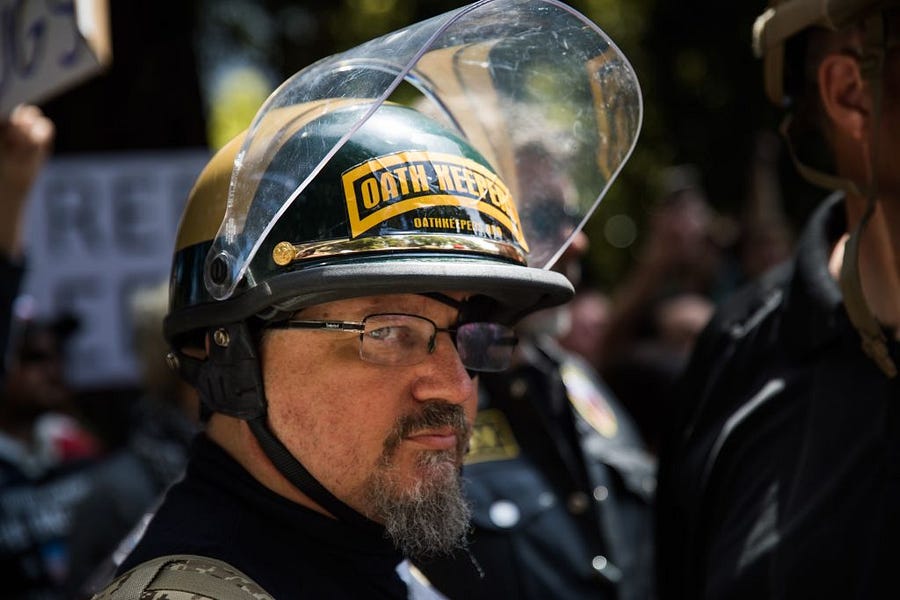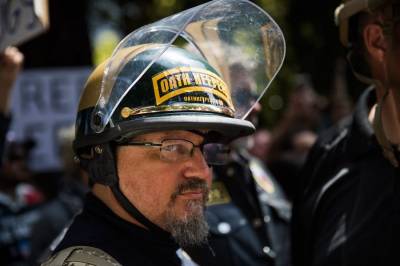Oath Keeper leader Stewart Rhodes and four co-defendants will become the first Americans in a decade tried for seditious conspiracy when their trial begins Tuesday. All were charged days after the January 6 Capitol insurrection.
Federal prosecutors accuse Rhodes and his co-defendants of conspiring to “oppose by force the lawful transfer of presidential power” when they participated in the attack. Starting in December 2020, Rhodes and other Oath Keepers allegedly “coordinated travel across the country to enter Washington, D.C., equipped themselves with a variety of weapons, donned combat and tactical gear,” on January 6, according to prosecutors.
What is seditious conspiracy?
It occurs when two or more people “conspire to overthrow, put down, or to destroy by force the Government of the United States, or to levy war against them, or to oppose by force the authority thereof, or by force to prevent, hinder, or delay the execution of any law of the United States, or by force to seize, take, or possess any property of the United States contrary to the authority thereof.” Seditious conspiracy is punishable with up to 20 years in prison and a potential fine.
The law was enacted in 1862 as part of the Second Confiscation Act, which states that “if any person shall hereafter incite, set on foot, assist, or engage in any rebellion or insurrection against the authority of the United States,” they would be punished with a possible fine and up to a 10-year sentence.
Seditious conspiracy is a subset of conspiracy—the crime of working with someone else to commit a crime. Proving conspiracy requires several elements, according to Sarah Ludington, Duke University law professor: an agreement between two or more people to commit a crime and taking substantial acts to do so.
Seditious conspiracy is “acting for the purpose of preventing the government from enforcing the law as a government,” Alan Rozenshtein, University of Minnesota Law School professor and former Justice Department official, said.
Why are Rhodes and his co-defendants being accused of seditious conspiracy?
The Oath Keepers believe that the federal government has been “coopted by a cabal of elites actively trying to strip American citizens of their rights,” according to the indictment. The militia group, founded in 2009, will accept anyone as members but focuses specifically on recruiting former and current military and law enforcement personnel.
Federal prosecutors say Rhodes and his co-defendants planned to use force to “prevent, hinder, or delay” the certification of the Electoral College vote.
As outlined by the Justice Department, Rhodes and his co-defendants allegedly:
“conspired through a variety of manners and means, including: organizing into teams that were prepared and willing to use force and to transport firearms and ammunition into Washington, D.C.; recruiting members and affiliates to participate in the conspiracy; organizing trainings to teach and learn paramilitary combat tactics; bringing and contributing paramilitary gear, weapons and supplies – including knives, batons, camouflaged combat uniforms, tactical vests with plates, helmets, eye protection and radio equipment – to the Capitol grounds; breaching and attempting to take control of the Capitol grounds and building on Jan. 6, 2021, in an effort to prevent, hinder and delay the certification of the electoral college vote …”
The 48-page indictment outlines how Rhodes allegedly sent messages to his followers via the encrypted messaging app Signal, encouraging them to refuse the results of the election. “We aren’t getting through this without a civil war,” Rhodes said in a November 5, 2020, message. “Too late for that. Prepare your mind, body, spirit.”
Jury selection will begin on Tuesday, and the trial is expected to last about five weeks.
According to Roger Parloff, senior editor at Lawfare, one complicating issue in this case is that Rhodes and his lawyers claimed that he had hoped that Donald Trump would invoke the Insurrection Act, which gives the president the authority to use the military in cases of “extreme civil disturbance.”
“So, all the conspiring to do that [stockpiling weapons] was not a crime in their view,” Parloff said. “This was a contingency plan.”
The government will contest that this gives Rhodes and the other defendants cover for their actions.
The last conviction for seditious conspiracy in a high-profile case came in 1995, when Omar Abdel Rahman, the “Blind Sheikh,” and his co-conspirators were convicted in connection with the 1993 World Trade Center bombing.
In 1954 four Puerto Rican nationalists stormed into the Capitol and shot five congressmen. As Lawfare documented, the Justice Department charged all four and 13 additional members of the group with seditious conspiracy. (Four pleaded guilty and 13 were convicted at trial).
The most recent (and also unsuccessful) seditious conspiracy trial came 10 years ago. The militia group known as the Hutaree militia was accused of inciting an uprising against the government, and several of its members were charged in 2010. At the 2012 trial, a judge ordered acquittals on the seditious conspiracy charges, “saying prosecutors relied too much on hateful diatribes protected by the First Amendment and didn’t, as required, prove the accused ever had detailed plans for a rebellion,” reported the Associated Press.
It is impossible to predict what the outcome of this upcoming trial will be. “I think the stakes are quite high,” Parloff said, adding acquittals would be an embarrassment for the government. “Politically it would be a huge humiliation for [United States Attorney General] Merrick Garland Justice Department.”







Please note that we at The Dispatch hold ourselves, our work, and our commenters to a higher standard than other places on the internet. We welcome comments that foster genuine debate or discussion—including comments critical of us or our work—but responses that include ad hominem attacks on fellow Dispatch members or are intended to stoke fear and anger may be moderated.
With your membership, you only have the ability to comment on The Morning Dispatch articles. Consider upgrading to join the conversation everywhere.